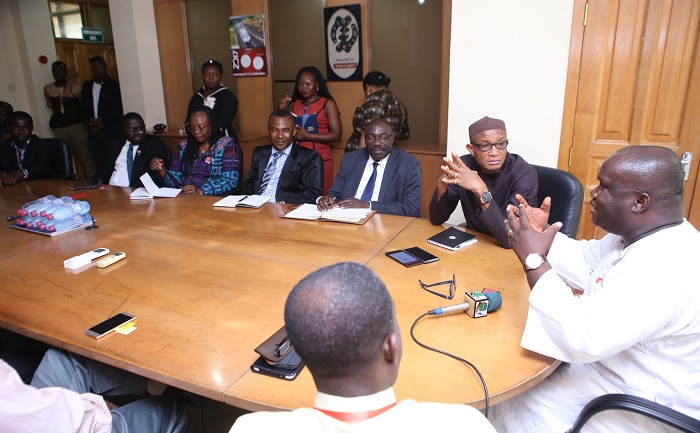
Information Minister hints of dialogue on state ownership of media
The Minister of Information, Mr Mustapha Abdul-Hamid, says he will initiate a public dialogue on state ownership of the media and explore options to enhance their operations.
He said reviewing state ownership of the media could help the media deal with some of the challenges they faced.
During a familiarisation tour of the Graphic Communications Group Limited (GCGL) in Accra yesterday, Mr Abdul-Hamid said he found the concept of state ownership of the media in a democratic arrangement as an anomaly, adding: “l don’t think that the state should own the media.”
The visit formed part of the minister’s programme of visiting all media houses to familiarise himself with their operations and build relationships to facilitate effective collaboration and government communication.
He and his entourage were conducted round the various departments and subsidiaries of the GCGL.
Interacting with the management of the GCGL during the tour, Mr Abdul-Hamid, expressed the view that state ownership of media was a mark of authoritarianism that sought to emasculate the media and the people.
He said the public should be allowed to own the media and manage them in accordance with the laws of the land to enhance Ghana’s democracy.
He said political pressure from the government and particularly from the largest opposition political party was one of the major challenges facing the state-owned media.
“One of the challenges facing the state-owned media is that when any party is in opposition, it accuses the media of being bias,” he said.
He was of the view that the media should work for both the government in power and the parties in opposition.
“Our Constitution recognises the concept of state ownership of the media, but the setting up of the National Media Commission (NMC), which is mandated to insulate the state-owned media from state control, is a contradiction,” he said.
He said it was virtually impossible to insulate something from the control of its owner.
Mr Abdul-Hamid said as the Minister of Information, he was the liaison officer between the government and the people, giving out government information and receiving feedback on governance processes from the citizens to boost national development.
But he was quick to add that he would not succeed in his role without the media, since they were indispensable to his role and to government’s communication activities.
“If I must function properly as a minister, I need to understand properly the workings of the media, understand what they go through to produce the news and collaborate with you to make it an effective mechanism to enhance development and democracy,” he said.
He commended the GCGL for undoubtedly being the most successful media house in the country, adding: “You have to be commended for your tremendous performance.”
Other issues
Mr Abdul-Hamid refuted rumours making the rounds that the government intended to appoint spokespersons in all the ministries to do what public relations officers were supposed to do.
He explained that the government was only going to appoint four key government spokespersons to complement his role as the Minister of Information.
He further explained that the decision to engage spokespersons for key sectors was to enhance the capacity of the government to communicate effectively on different important issues.
The spokespersons, he said, would focus on the economy, social services, governance and security and infrastructure.
On the Right to Information and the Broadcasting bills, the minister said he was committed to ensuring the passage of both bills to enhance the operations of the media.
He explained that since the process to get the RTI Bill was aborted and there was a new Parliament in place now, he would begin the process by re-introducing the bill to Parliament for consideration this year and deal with the Broadcasting Bill next year.
Graphic management
For his part, the Managing Director of the GCGL, Mr Kenneth Ashigbey, briefed the minister on the operations, achievements and challenges of the company.
Notable among the challenges, he said, was newspaper review by the television and radio stations which negatively impacted on the sales of the company’s newspapers.
Mr Ashigbey called on the government, which holds the copyright of the state-owned newspapers, to put in place measures to address the problem.
However, he was quick to add that the GCGL was not advocating that newspaper review had to be stopped but that it should be organised in a way that would be mutually beneficial, instead of collapsing the newspaper business.
He also appealed to the minister to facilitate the payment of all debts owed the company by government agencies, particularly the ministries, for subscription, printing of government textbooks, among other services provided.
On information flow, Mr Ashigbey called on the minister to ensure proper and free flow of information through the state-owned media to avoid rumour- mongering.
He assured the government of the cooperation of the company to enhance democracy.
Making a contribution, the Director of Newspapers of the GCGL, Mr Yaw Boadu-Ayeboafoh, was of the view that because the copyright of the state-owned media was vested in the President, it made it a bit difficult to regulate newspaper review.
“As long as the President thinks that what is being done with the media is in the public interest, he may not regulate it,” he said.
But, according to him, people were doing their private business with public property and underscored the need for some symbiotic relationship to ensure mutual benefits.
Writer’s email
